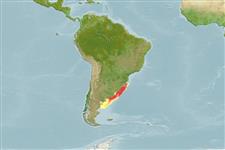Elasmobranchii (tubarões e raias) (sharks and rays) >
Carcharhiniformes (Ground sharks) >
Triakidae (Houndsharks) > Triakinae
Etymology: Mustelus: Latin for weasel, an ancient name for sharks, possibly referring to the pointed snouts, swift movements and/or rapacious feeding behavior of smaller predatory sharks [strictly not tautonymous with Squalus mustelus Linnaeus 1758 since type was designated by the ICZN]. (See ETYFish); fasciatus: Latin for banded, referring to vertical dark bars on body (at least in young). (See ETYFish).
More on author: Garman.
Environment: milieu / climate zone / depth range / distribution range
Ecologia
marinhas demersal; intervalo de profundidade 1 - 250 m (Ref. 56500), usually 1 - 50 m (Ref. 56500). Subtropical; 30°S - 47°S
Southwest Atlantic: southern Brazil to northern Argentina.
Length at first maturity / Tamanho / Peso / Idade
Maturity: Lm 123.3 range ? - ? cm
Max length : 150 cm TL macho/indeterminado; (Ref. 244); common length : 70.0 cm TL macho/indeterminado; (Ref. 6077)
Longer snout relative to the size of the eye, head more flattened. Back brown with narrow transverse bands of darker separated spaces. Yellow spot in front of each eye above each orbit. Fins dark with narrow edgings lighter. Lower surfaces whitish (Ref. 6032).
Found on the continental shelf. Newbies are found on beaches of between 1 and 5 m depth, juveniles occupy inshore waters at between 15 and 50 m, and adults are found down to 50 and on upper slopes of up to 250 m in depth (Ref. 56500). Presumably feeds on crustaceans and other benthic invertebrates. Ovoviviparous, embryos feed solely on yolk (Ref. 50449). Size at birth at or below about 39 cm. Utilized fresh-frozen and dried salted for human consumption.
Ovoviviparous, embryos feed solely on yolk (Ref. 50449). Distinct pairing with embrace (Ref. 205). Migrate to the shore to give birth at the shortest time possible (Ref. 56500).
Compagno, L.J.V., 1984. FAO Species Catalogue. Vol. 4. Sharks of the world. An annotated and illustrated catalogue of shark species known to date. Part 2 - Carcharhiniformes. FAO Fish. Synop. 125(4/2):251-655. Rome: FAO. (Ref. 244)
Categoria na Lista Vermelha da IUCN (Ref. 130435)
Ameaça para o homem
Harmless
Utilização humana
Pescarias: espécies comerciais
Mais informação
Idade/TamanhoCrescimentoComprimento-pesoComprimento-comprimentoFrequência de comprimentoMorfometriaMorfologiaLarvasDinâmica larvarRecrutamentoAbundânciaBRUVS
ReferênciasAquaculturaPerfil para aquaculturaEstirpesGenéticaElectrophoresesHereditariedadeDoençasProcessamentoNutrientsMass conversion
ColaboradoresFotografiasStamps, Coins Misc.SonsCiguateraVelocidadeTipo de nataçãoÁrea branquialOutras referênciasCérebrosVisão
Ferramentas
Relatórios especiais
Descarregue XML
Fontes da internet
Estimates based on models
Preferred temperature (Ref.
123201): 10.5 - 18, mean 14.5 °C (based on 166 cells).
Phylogenetic diversity index (Ref.
82804): PD
50 = 0.5000 [Uniqueness, from 0.5 = low to 2.0 = high].
Bayesian length-weight: a=0.00224 (0.00105 - 0.00478), b=3.14 (2.97 - 3.31), in cm total length, based on LWR estimates for this Genus-body shape (Ref.
93245).
Nível Trófico (Ref.
69278): 4.2 ±0.7 se; based on diet studies.
Resiliência (Ref.
120179): Muito baixo, tempo mínimo de duplicação da população maior que 14 anos (Fec = 4).
Fishing Vulnerability (Ref.
59153): Very high vulnerability (90 of 100).
